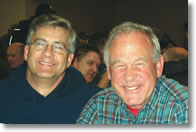Rev. Michael Saylor: ‘Its a Real Honor to Be Their Pastor’
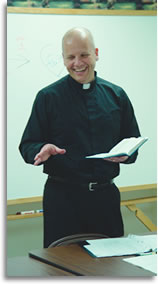 |
|
Rev. Michael SaylorPhotos by Steve Blakely, BB Design |
It was one of the great things I’ve ever experienced,” says Rev. Michael Saylor about seeing four generations of a family at the Communion rail at Redeemer Lutheran Church in Convoy, Ohio.
While the congregation may be, in Saylor’s words, “an overgrown family church,” the 1999 graduate of Concordia Theological Seminary, Fort Wayne, notes that “people in Convoy know the people of Redeemer care about the community and care about the kids. That’s what attracted me to Redeemer in the first place.”
Saylor came to the pastoral ministry by a less-thantraditional route. While a senior in high school, his girlfriend invited him to attend an LCMS church. “And the next thing I knew, I went through adult-instruction classes and was baptized and confirmed at age 17.”
(Laura, his girlfriend, is now his wife of 23 years. They have seven children, the oldest in college.)
Becoming a pastor never crossed Saylor’s mind until his late 20s, when he began asking what God wanted him to do. By age 30, he was moved to enroll at Concordia Theological Seminary. While he had little church background, the seminary experience confirmed God’s call to be a pastor.
“What I loved about the seminary is how they showed us the Gospel so clearly,” he says. “This is what Jesus has done for us, and this is what we are to believe, teach, and confess.”
As a pastor, his “greatest joy” is preaching the Gospel assurance of salvation through faith in Jesus Christ. He also thrives in teaching the 60 adults in Bible class between Sunday services. “Engaging people with the Word: It’s a great, great joy because the Gospel does make such a tremendous difference in people’s lives,” he says.
Ministry today has its challenges. “It’s mostly trying to fight the attitude of the world that is just completely the antitheses of the Gospel and setting what’s really a priority,” Saylor says. His personal challenges involve “keeping a perspective,” between ministry and family life and balancing time to call on members with time for personal study and preparing for sermons and teaching.
Especially formative was his vicarage in a mission congregation in Athens, Ala., under the late Rev. Reuben Garber, formerly president of the Indiana District. “Reuben just showed me what it meant to preach and demonstrate the Gospel and how he related to congregation members and helped people,” Saylor says.
Saylor also was led to Redeemer because he could supervise fieldwork students from the Fort Wayne seminary, which is 40 miles away. “I’ve had 10 fieldworkers, and I love that opportunity to let them talk and share and give some advice,” he explains.
After seven years as the sole pastor of the 500-member congregation, Saylor feels “extremely blessed to be with this congregation.” He adds that the people are “tremendously encouraging” to him and to Laura. “It’s a real honor to be their pastor,” he says.
— Roland Lovstad
Dr. Thomas Zelt: Reaching Past ‘the Campus and Sunday Morning’
|
|
|
Dr. Thomas Zelt (left) and
|
From a perspective of 25 years in the ministry, Dr. Thomas Zelt has a seasoned view of what the seminaries are seeking to do to prepare pastors for a multicultural, post-Church society.
For the past 15 years, Zelt has served Prince of Peace Lutheran Church and School in Fremont, Calif., a community where the public school district counts 138 languages spoken in the homes of its students. Fremont’s Mandarin-speaking Chinese community has more than doubled during Zelt’s tenure, reaching 42,000—about 20 percent of the population.
“Our [parochial] school reflects the community, not quite as well as we would like, but it’s doing fairly well,” Zelt says. “The church overall is a little less so, but we have worship in four different languages.”
Zelt and Associate Pastor David Sauer work with the English congregation. Associate Pastor David Wilson, who speaks Mandarin, works with the Chinese ministry, which in turn has prompted him to begin a Burmese ministry. A church member who is going through the deacon program leads a fledgling Hispanic ministry. The congregation also hosts and maintains close connection with a Telegulanguage Indian ministry.
“I love helping people in the congregation see doors that God is opening and figure out ways to go through them,” Zelt says. “Truly the field is white unto the harvest, but it is a field where we don’t have a lot of experience and very little training.”
He says he treasures his seminary education: “It gave us good biblical, theological, confessional understanding and a smattering of practical ideas in how to go about ministry after the seminary.” However, Zelt believes that coming from a “churched mentality culture” makes it difficult for men to cross barriers into other cultures in a post-Church society: “I think it will be increasingly difficult in a post-Church, multicultural society to not have infield training of our future pastors.”
Zelt graduated from Concordia Seminary, St. Louis. After earning a master’s degree in Israel, he also earned a doctorate in worship from Fuller Seminary in Pasadena. Yet, he adds that a lot of his learning for ministry at Prince of Peace has been on the job.
“God is very gracious,” he comments, “The Holy Spirit has just allowed certain things to be learned over a period of time; so God should get all the credit here.” From a practical side, he has learned to find people and resources around him through “trial and error”—and by taking “a lot of time” to figure things out.
“We have to figure out ways to open doors to a world that is very uncomfortable with the Church and sees the Church as somewhat irrelevant,” he explains. “We have to find new ways to reach past our campus and way past Sunday morning.”
The LCMS seminary presidents agree that field experience is essential in pastoral formation. Both seminaries offer in-field pastoral formation programs, and the traditional residential programs at both institutions include increasing opportunities for students to engage in cross-cultural experiences.
— Roland Lovstad
Dr. Lang Yang: Distance Education Fosters Ministry to Hmong People
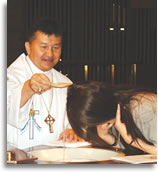 |
|
Dr. Lang Yang
|
Dr. Lang Yang serves Hmong ministries at St. Michael Lutheran Church, Richville, Mich., and Our Savior Lutheran Church, Lansing. His story highlights how a flexible route to ordination is expanding the ethnic diversity of the LCMS. To read this Web-exclusive story, click here.
Chaplain Oliver Washington Jr.: Twists and Turns Lead to Chaplaincy
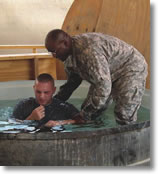 |
|
Chaplain Oliver Washington, Jr. baptizes a man in Iraq.Photo courtesy Chaplain Washington |
Soldiers often ask Chaplain Oliver Washington Jr. if he is really not afraid of going to war.
What comes to the chaplain’s mind are the words from 1 Tim. 1:17: “For God does not give us a spirit of timidity, but a spirit of power, of love and of self-discipline” (NIV).
As a mobilized chaplain of LCMS Ministry to the Armed Forces, Washington supports deploying units of the U.S. Army First Cavalry Division (as well as other units) at Fort Hood, Texas. He says certain experiences allow the opportunity to enforce the principle that “we fight as we train.”
“Just like Jacob had to wrestle with personal insecurity to overcome doubts about God’s grace and ability to provide,” he says, “we must wrestle with His promises in our lives. Remember, even David had to face Goliath, his giant. So we must also face our giants.”
Washington, 44, is in his second year of mobilization at Fort Hood. During his 25-year military career, he has served in other units across the country and overseas.
He was raised in the Roman Catholic Church. As a freshman in college in Michigan in 1983, he says he began “attending various denominations, attempting to develop a relationship with Christ, as opposed to man and tradition.”
That searching led him on a journey that twisted and turned, and included service in the National Guard, before he became a Lutheran and enrolled at Concordia Theological Seminary (CTS), Fort Wayne.
In many ways, his seminary experience formed his ability to minister to the special needs of the military, Washington says.
“The relationships I established at CTS with seminarians from the Bahamas, Venezuela, Ghana, Haiti, Korea, and Russia allowed me to see the world and the Gospel message from another person’s perspective. As a result, I can better communicate the love of God and Jesus Christ with those with whom I come in contact, especially during a crisis.”
— Sandy Wood
Rev. Joshua Schneider: Equipped for Hawaiian Ministry
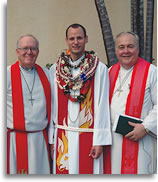 |
|
Rev. Joshua SchneiderPhoto courtesy
|
Becoming a pastor of a church in Hawaii was not what Rev. Joshua Schneider (center) had in mind when he decided to pursue a degree in biology and chemistry in college. But God had a plan. To learn about Rev. Schneider’s journey in this Web-exclusive story, click here.
Dr. Tilahun Mendedo: Building on a Vision for Community
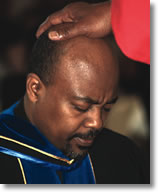 |
|
Dr. Tilahun MendedoPhoto courtesy
|
It’s an honor for me to hold this position, to serve for the people of God in this great nation,” says Dr. Tilahun Mendedo, who will be inaugurated this month as president of Concordia College in Selma, Ala.
Mendedo says the present and the future of the college will build on the determination of the past, and he expresses admiration for Rosa Young, the African-American woman, who though not a Lutheran, worked with the Synodical Conference to establish the Alabama Lutheran Academy and Junior College to serve African-American students.
“She was ahead of her time and laid a foundation for people like me and others,” Mendedo says. “For me as a leader, I contemplate on her legacy and from there I envision where we are going.”
Mendedo, 39, brings a unique background to the office. At age 15, he became a Lutheran and by age 18 was a youth leader and evangelist, helping to start the first Lutheran church in his home city of Nazareth, Ethiopia. After graduating from the Mekane Yesus Theological Seminary in Addis Ababa, he taught in the Bible school and became school administrator and curriculum advisor for the entire church in Ethiopia.
With an interest in the study of missions, he chose to study for a Ph.D. at Concordia Theological Seminary, Fort Wayne, where he received a scholarship.
“Once I got here, I found out our theological values and our theological understandings are more coherent with The Lutheran Church—Missouri Synod,” he explains. “That was a time where God used me to see His grace and mercy through a wonderful theological education at Fort Wayne. I enjoyed the community of faculty and staff, the student fellowship, and the surrounding churches.”
Because of his experience, he says six other Ethiopian students have chosen to study in the seminary’s Ph.D. program.
As a fieldworker at Zion Lutheran Church, Corunna, Ind., Mendedo was moved by the love and care the congregation showed for him and his family. “That really encouraged me to consider serving in one of our congregations or schools here in the Missouri Synod,” he says.
Mendedo became an LCMS pastor through colloquy in 2003 and took a call to Faith Lutheran Church in Mobile, Ala., where he served from 2004 until accepting the Concordia presidency last November. While serving the congregation, he completed his research and dissertation and received his Ph.D. in 2007.
The new president says he envisions a Concordia that is Christ-centered; diverse; expanding academic programs, including church work; resourcing area churches; collaborating with the other nine LCMS Concordias; and reaching beyond its campus to a wide area of the South and even overseas.
“In order to accomplish such plans, we need the support of our church body through prayer, financial support, and volunteer services,” Mendedo says. He invites Lutherans to visit the city and college, which is the only historically black Lutheran college in the U.S. “With God’s people support, we can make a big difference in this ministry that we share,” he adds.
— Roland Lovstad
Rev. David Sternbeck: Returning as Pastor to His People
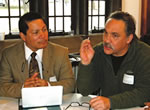 |
|
Rev. David SternbeckPhoto by Paula Schlueter Ross/LCMS Board for Communication Services |
Separated from his Native American culture since age 3, Rev. David Sternbeck describes the past 14 years as “an incredible journey.” He came to faith in 1996, his family drew him back to his culture, and he joined Makah Lutheran Church in Neah Bay, Wash.
Recruited by the Lutheran Association of Missionaries and Pilots U.S. (L–US) as part of their efforts to encourage Native Americans in ministry, Sternbeck began a long journey toward becoming an LCMS pastor. Last December, he was ordained and installed as a pastor of Makah Lutheran Church, becoming the third Native American pastor in the LCMS.
Rev. Sternbeck is a native of the Nuu-chah-multh Nation, which includes the Makah Band. He is a graduate of the Ethnic Immigrant Institute of Theology (EIIT) at Concordia Seminary, St. Louis.
For the past five years, he served as a licensed deacon and EIIT vicar in Neah Bay. During that time, the congregation grew from six to 40 members and recorded 27 Baptisms.
The EIIT program was designed for men like Sternbeck. It allowed him to study and serve within his cultural context. He took lectures and participated in discussion through the Internet and attended annual one-week seminars in St. Louis. Rev. William Norton, a retired area pastor, served as his supervisor and mentor.
Sixteen Northwest District pastors braved icy roads to attend his ordination. “All those guys showed up and that church was packed way out the doors,” Sternberg says. “These people were so impressed with the amount of love, devotion, and support that the LCMS was showing.”
Some weeks later, a member of the tribal council called to ask if he and his family could be baptized. They had never attended a church. “There is such an emptiness in us,” he said.
“People are calling my house, saying, ‘We want this Gospel,’” Sternbeck remarks. “Who thought we would ever see that day?”
He also has ability to attract workers: One man has begun an EIIT vicarage at Neah Bay. Another man is studying to become a licensed deacon, and his wife is taking deaconess studies through EIIT. A third man, with a degree from a Bible college, is taking classes to become a pastor through colloquy.
Sternbeck also has been assigned by the L–US to partner with the district and Zion Lutheran Church, Fairbanks, Alaska, to recruit a native Alaskan into the pastoral ministry.
When Sternbeck’s family knew he was in the seminary, his family gave him the name Nanassulth—“one who hears the Creator and speaks what He says.”
“That’s quite a name to live up to,” Sternbeck says.
Makah Lutheran Church receives support from the Northwest District and L–US. Dr. Don Johnson, L-US executive director and a Makah from Neah Bay, was for many years the only ordained Native American pastor in the LCMS.
Rev. David Sternbeck (right) makes a point during a “table talk” at concordia seminary’s multi-ethnic symposium feb. 1–2. at left is rev. miguel luna of trinity lutheran church, mount angel, ore.
— Roland Lovstad
—
About the Authors:
Roland Lovstad is an editor-at-large for The Lutheran Witness and a member of Immanuel Lutheran Church, Perryville, Mo.
An award-winning reporter and editor, Sandy Wood is a member of Chapel of the Cross Lutheran Church, St. Louis, Mo.



